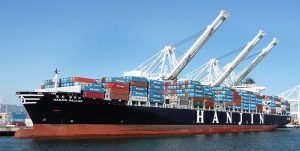

Hanjin Container Ship Photo by: Flickr user Ingrid Taylar
It was a surprise move back in November when Korea Line swooped in to buy Hanjin Shipping’s Asia-U.S. assets. South Korea’s second largest bulk shipping company saw it as an opportunity to expand into container shipping.
It turns out that Korea Line’s parent company, SM Group is not as positive about the opportunity.
SM Group, a mid-sized business conglomerate that owns South Korea’s No. 2 bulk carrier Korea Line Corp., said Tuesday that its board has refused to approve a plan to acquire one of Hanjin Shipping Co.’s major assets.
SM Group said its board of directors turned down the proposal to acquire the troubled shipper’s U.S.-Asia route at a stakeholders meeting.
…
Stakeholders were reportedly against the proposal, citing that Korea Line does not have experience in the container shipping businesses, and that a general industrywide slump may cause a cash shortage.
An interesting fact brought up in the Yonhap article is that Korea Line was actually bought by SM Group when Korea Line, similarly to Hanjin Shipping, filed for bankruptcy protection five years back.
It is probably a wise move on the part of SM Group to block their shipping company, which has had its share of financial struggles, from entering the trans-Pacific container trade business with the assets of another struggling shipping company.
Still, this is not exactly the end of Korea Line entering trans-Pacific container trade business with Hanjin’s Asia-U.S. assets. Yonhap brings up a clause that would allow a separate corporate body to acquire the assets. A Journal of Commerce (JOC) article by Dustin Braden expands on how Korea Line plans to utilize that clause to move forward into container shipping similarly to its original plan:
While SM Group’s board rejected Korea Line’s effort to join the trans-Pacific trade, officials from SM Group told IHS Fairplay, a sister product of JOC.com within IHS Markit, that the company could still launch its container shipping business in April as planned, but under a separate entity that has to be incorporated independently of SM Group. That new entity, expected to be named SM Line Corporation, which has already begun acquiring vessels, will likely have to rely heavily on non-vessel-operating common carriers for its volume as beneficial cargo owners who were burned by the Hanjin bankruptcy may be reluctant to load their cargo on an untested liner.
An interesting thing that Braden brings up in his JOC article is that NVOCCs (Non Vessel Operating Common Carriers) may be attracted to this new carrier in the trans-Pacific trade lanes because SM Line Corporation “will likely low ball rates in order to gain market share.”
There also may be a little irony to be found in the separate entity to carry out the trans-Pacific trade is named after the parent company that blocked Korea Line from entering that container shipping trade.
It will be something to watch if SM Line can become a significant player in trans-Pacific trade outside of the major carrier alliances operating there.
One thing we know now is that Korea Line itself, after winning the bid for Hanjin’s assets, will not be.
Discover more from reviewer4you.com
Subscribe to get the latest posts to your email.






